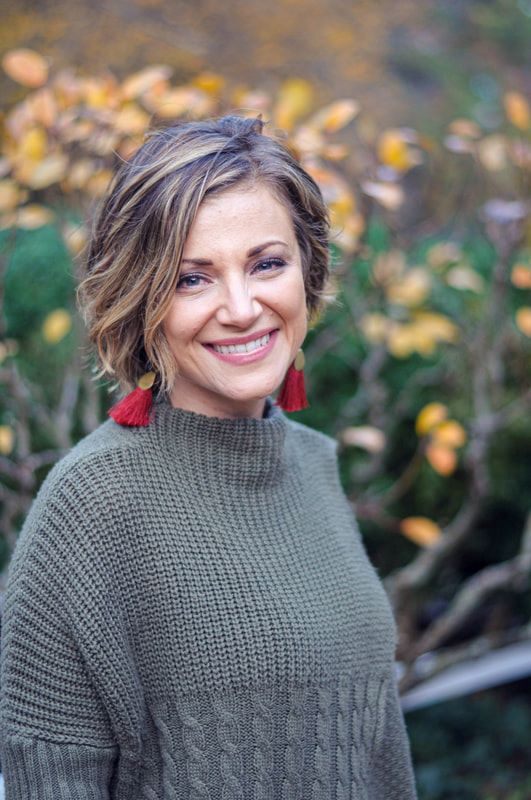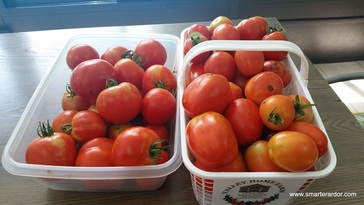
I roasted two pans of tomatoes with garlic and olive oil, and I made eight cups of mediocre salsa and still had enough to give a basket away and keep a pile on my counter. I thought through how to address the overgrowth.
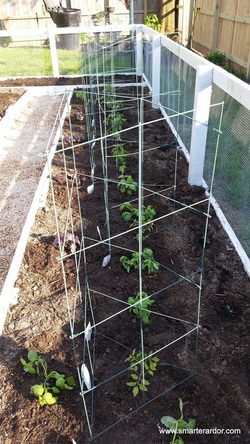
When we returned from a week away, I was delighted to see that our bell peppers had finally grown taller, though they were still not producing. The next day, I looked at the small, basil lookalike I had just uprooted and asked Google what sweet pepper plants look like before gently replanting it. Those tall “pepper plants” were actually tall, thriving weeds with shallow roots. I couldn’t believe how easy they were to remove once I identified them, or how sparse that bed looked once they were gone. They were blocking the sun from my tiny pepper plants that, two weeks later, are finally sporting hopeful flowers waiting for pollinating. It may or may not be too late for them.
Anne Lamott says, “The garden is about life and beauty and the impermanence of all living things... And what a wonderful relief, every so often, to know who the enemy is—because in the garden, the enemy is everything: the aphids, the weather, time. And so you pour yourself into it, care so much, and see up close so much birth and growth and beauty and danger and triumph—and then everything dies anyway, right? But you just keep doing it.”
Sometimes I get busy with the kids, or lazy, or I don’t feel like covering myself from head to toe to protect myself while I toil in the sun, and I let the garden languish. I don’t water; I assume the rain will hold it, assume there couldn’t be that many tomatoes or pole beans to harvest, assure myself my husband can do it later—I can do it later—it will be fine. The work I’ve already done will sustain it.
I’ve cultivated a family: birthed and am raising children; I nurture them and love them, and I work to maintain a marriage and neither are really so unlike gardening. Sometimes I get busy or distracted or lazy or selfish and I let my parenting or my marriage languish. Maybe I don’t ask questions like I really want to know the answers; maybe I don’t listen attentively; maybe I don’t look my husband in the eye; maybe I forget to kiss him like I mean it; maybe I keep my head down on my tasks when I should let them go to sow time into our love.
In the garden, I’ve found, the longer I stop tending the more hesitant I am to get back to it. We tend the garden in our next door neighbors’ yard, on the other side of the new fence that now has a “neighbor gate.” I can see the tops of my tomato and bean plants peeking over the top. But after a period of neglect, I am reluctant to see the damage that can only be pinned on me.
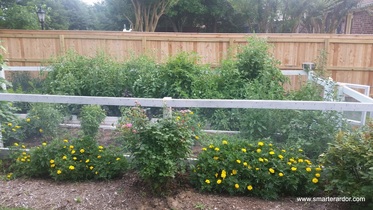
And I don’t have to tell you, but I will; it’s really not different with love. I have been searching for months for a quote I just know is in The Grapes of Wrath by John Steinbeck, and I don’t think I’m going to find it. In high school I had it scrawled on an index card in a plastic Quik container I had repurposed to hold my favorite quotes, but now it’s gone and not even Google can help me determine whether it was really The Grapes of Wrath or My Antonia or whether I made it up entirely. One day I’ll reread them both, but for now I will paraphrase: “No one plants a tree and then just lets it wither and says, ‘I guess it was not meant to be.’ But they do that all the time with their loves.”
So when I am not actively tending to my marriage, ensuring it’s health, dead heading the flowers, trimming back the overgrowth, harvesting the fruit, picking the weeds, and showering it with what it needs, there will be consequences. They may not show immediately; for a while, they may even look like growth. But I want our love to grow up, strong, together— in the confines of the structure we’ve built to support it—not, like my tomatoes, which have entangled themselves with each other, blocking the basil from the light and lunged out of their beds and across the path, making it impassable. I’ve had to discard a regrettable amount of wasted fruit from those plants because they didn’t receive the care they needed. I don’t want to do that with my love.
The garden has reminded me not to wait until needs are emergent and pressing to address them. Water before the ground is parched, trim back overgrowth before it causes trouble to adjacent plants, pull weeds before they choke out the roots, harvest fruit before it rots on the vine.
I walked back into our yard the other day, in jeans and a chambray shirt, sneakers, gloves and baseball cap, drenched in sweat, shears in hand and dragging a 39 gallon bag of overgrowth and rotten tomatoes behind me. We are eating from our garden or preserving what we can’t eat most days. But the work I did yesterday does not excuse me from working again today—it might make today’s work lighter, more enjoyable—but I don’t get a pass. I can’t rest on yesterday’s harvest, or the health of the garden yesterday any more than I can remember good times in our marriage and assume they will hold us now or in the future. They won’t—they can’t. I can’t assume my husband will do the jobs I committed to, although sometimes he does. I must accept the risk, when I neglect my garden, that I am putting it all at risk—everything we’ve worked for, how far we’ve come.
Our garden is a mess. A beautiful, imperfect mess full of all manner of insects and one enormous garden spider that has caused me to abandon at least one tomato for fear of becoming too well acquainted with her. But it’s our mess, and it’s bearing fruit. And it’s provided me with more than pesto, more than the 13 pints of tomatoes I’ve canned, or the sauce in my freezer or the salsa in my fridge. It’s taught me about the importance of daily care, and the consequences of neglect.

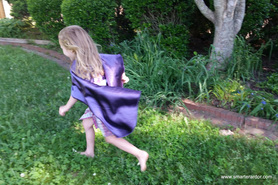
 RSS Feed
RSS Feed
